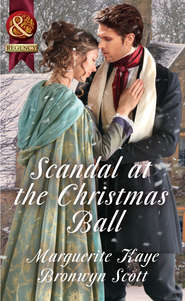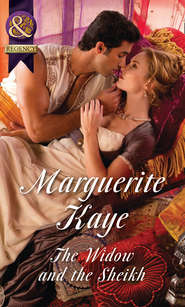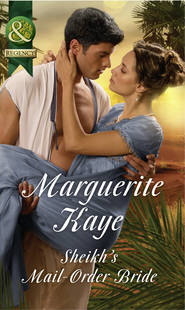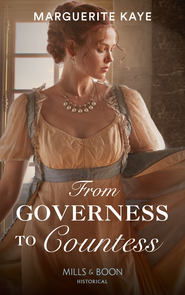По всем вопросам обращайтесь на: info@litportal.ru
(©) 2003-2024.
✖
The Highlander's Return
Настройки чтения
Размер шрифта
Высота строк
Поля
‘I’m going to have to take you in hand, Ailsa,’ Lady Munro had said firmly. ‘You’re not a child any more. It’s time you started dressing, and behaving as befits your position as a Highland laird’s daughter.’
Lady Munro had insisted on stays and lacings and stockings and all the other trappings of wealth and status, too. Not that Ailsa had anything against pretty clothes, but she felt constrained in them. Sometimes she yearned for the feel of her bare foot on sand, the sun on her neck, the freedom from corsets and lacing without having to face the recriminations that inevitably followed such minor aberrations.
Today’s toilette was an open robe made of silk woven in the Munro colours over a dark blue petticoat. As was the fashion, the bodice was tightly laced, showing off the curve of her bosom and the contrasting tiny span of her waist. Voluptuous, is how most men would describe her, but in this one respect Ailsa would have preferred to resemble her mother’s slimmer, less curvaceous figure. She was rather self-conscious about her body and despised the way it drew men’s attentions. The arisaidh, a traditional plaid shawl of blue-striped silk, which today she wore belted and pinned, went some way to disguise it.
Her indifference to the fulsome compliments she attracted and her rejection of all attempts to make love to her seemed, perplexingly, to encourage her admirers to try all the harder. Intimacy of that sort left Ailsa cold. Her handsome dowry and position as the rich laird’s only daughter ensured she had no lack of suitors, but despite the sheer volume of them, none had ever come close to touching her heart. Not in the way that …
Automatically, Ailsa put a sharp brake on that strain of thought. What was the saying? Once bitten, twice shy. She was in no need of a second lesson. Not that love entered into the equation, in any case. She existed for the sole purpose of making a good match—her father had made that abundantly clear six years ago.
The slow tolling of the bell in the castle tower began, rousing Ailsa from her reverie, its low peal reverberating out across the flat fertile Munro lands, bouncing off the mountains that bordered Errin Mhor to echo eerily in the still of the morning. The bell warded off the evil spirits that everyone knew lurked at a wake, ready to take advantage when people’s defences where down. It also marked the beginnings of the funeral rites.
It was time. Pulling her arisaidh up to cover her hair, Ailsa quit her chamber and made her way quickly down the stairs.
In the great hall her brother Calumn, cutting an imposing figure in full ceremonial Highland dress, readied the chief mourners for his father’s last journey. The low drone of the bagpipes being inflated was the signal for all to assemble in good order. The new Laird of Errin Mhor kissed his wife lingeringly on the lips. Madeleine, who was expecting their first child, would stay behind to be Lady Munro’s chief comforter—not that the newly-made widow would accept comfort from anyone, but it was the custom. As it was the custom that Ailsa, too, should remain with her mother while others formed the funeral procession, but in this Ailsa had been adamant. She would pay her last respects with the men, not sit meekly at home with Lady Munro’s chosen group of gentry women.
The dead laird’s piper struck up the mournful lament of the pibroch. Ailsa took the black cushion bearing her father’s gauntlets and hat from Calumn and made her way outside. The dead man’s champion, Hamish Sinclair, waited, astride a horse with a black-velvet cover, to lead the procession. Lord Munro’s own horse, similarly draped in black, was pawing nervously at the ground. Saddle-less, it was a stark symbol of the laird’s absence.
Four long poles were inserted under the coffin. By tradition, the first eight bearers were the deceased’s closest kin. Calumn and his half-brother Rory Macleod took the lead, a decision that had caused some controversy since Rory was not a blood relation of the dead laird, being the product of Lady Munro’s first marriage. Lord Munro had insisted his wife surrender her first born upon their own marriage. Lady Munro and Rory had been estranged ever since, but Calumn had insisted that his brother have his place at the funeral regardless.
The coffin was hoisted up from the bier. The pipes wailed. The bearers walked slowly down the front steps of the castle, keeping their eyes firmly focused ahead and concentrating on the task at hand, for it was a precarious job, balancing the heavy coffin on four thin poles.
Ailsa stood at the head of the mourners. Behind her, the long winding line of men and women fell in, ranked in order from the clan chiefs and their women to the castle servants, the laird’s tenants and serfs, crofters and cotters, drovers and fishermen. She knew most of them, if not personally then by reputation. Almost without exception the men wore the two plaids, the filleadh beg and the filleadh mòr, in defiance of the law that banned Highland dress for any but the aristocracy. Most of the women wore their best Sabbath blacks. Expressions were suitably sombre. The two horses, one mounted, one riderless, led the way.
The procession wended down the castle’s imposing driveway, through the heavy wrought-iron gates emblazoned with the Munro coat of arms, to the village of Errin Mhor where the first change of bearers took place. ‘Twas customary for this to happen while the procession continued, so the new bearers stood ahead in formation, two lines of four men performing the transfer of weight in pairs. Since dropping a pole was believed to signify the death of the bearer, each was very careful to effect a perfect handover. Villagers, bairns and even dogs stood silent, heads bowed respectfully as the procession passed on its way. The Munro siblings remained at the front of the mourners, a striking threesome with their golden hair and tall figures, that drew the eye of every onlooker and raised a sigh in the breasts of several.
‘Twas also tradition that refreshment in the form of uisge beathe, the water of life, otherwise known as whisky, was meted out in generous drams en route, for following a wake was thirsty work. Neither of the Munro brothers partook, but many others did. So much so that two hours later when they finally reached the lonely graveyard in a remote corner of the Munro land that was the traditional burial place of the lairds, the uisge beathe, combined with the steepness of the incline, the narrowness of the coffin track, and the suppressed anticipation of a long-awaited event finally coming to pass, a weariness had set in on the procession. The ordered train had become ragged. Red faces, sweaty brows and a general air of relief replaced the solemn expressions with which they had started the journey. The old laird was no lightweight.
Ailsa stepped aside at the gate, the eulogy and interment being strictly a male province. Not even she was brave enough to break that rule. She was joined by the other women. Tired and dusty, glad to have the long hike over without mishap, they stood around in little groups, by and large ignoring the ceremony at the graveside, occupying themselves with a little light gossip and a little idle speculation, murmuring together in the low, musical lilt of the Gaelic that they continued to favour over the use of English decreed by the new law.
Ailsa roamed from one clique to another, accepting the politely offered platitudes and condolences from those ladies she knew her mother would insist be given precedence, before joining a huddle of Errin Mhor tenants, the wives and daughters of local villagers. At the centre of the group was Shona MacBrayne, the fey wife, with whom Ailsa spent some of her days, gathering herbs and mixing potions, assisting her in tending to the sick and helping out at the occasional birth.
‘I’ll no insult you by saying I’m sorry, Ailsa,’ Shona said in a voice too low for the others to hear. ‘Your father had his time and plenty more besides. I can only pray that the journey he is taking now is up the way, and not down.’
‘Whichever direction it is, you can be in no doubt that it is of my father’s choosing,’ Ailsa said irreverently. Like everyone else, she was beginning to feel the light-headed relief that so often occurs in the aftermath of a funeral.
Shona chuckled. ‘Aye, well, at least now he’s out of the way that brother of yours can finally get his hands on the Munro lands. They’re in bad heart, no getting away from the fact that the old laird didnae gie them the attention they need.’
‘Poor Calumn, he’s been champing at the bit to make changes since he returned last year,’ Ailsa agreed with a smile.
‘Aye, and change is bound to put your mother’s nose out of joint. However carefully he goes about things, there’s going to be a stramash,’ Shona said astutely. ‘You’d be better off out of it. Anyways, ‘tis time you were settled in a home of your own. Your father was a long time dying; I’d no be surprised if the McNair was getting impatient to put his ring on your finger.’
Ailsa fiddled with the fastening of her brooch. ‘Why should he be? My father settled things between us a while ago. The contracts are signed—what’s the rush?’
Shona’s brow furrowed. ‘It is a good match for the clan, Ailsa. Donald McNair is a rich man, the marriage will secure us a good ally. Don’t tell me you’re thinking of throwing him o’er?’
‘Of course not. I’m perfectly well aware of how good a match it is. My father would not have made it otherwise.’
‘And you, lass. What do you think of it all?’
‘What does it matter what I think?’ Ailsa said dismissively. Seeing the shocked look on old Shona’s face, she realised she had been indiscreet. One thing to think such things, quite another to share them with her father’s—brother’s—tenants. She touched the old woman’s arm. ‘I like him well enough. As well as he likes me, any road. Donald and I have an understanding, Shona.’ Ailsa stooped to give her a quick hug. ‘Don’t fash yourself over me, for there’s no need. I can take care of myself.’
‘Aye, that’s true enough,’ Shona agreed sadly. ‘Your mother—’
But at this point they were interrupted by the blacksmith’s wife wanting Shona’s opinion on the best way to treat her husband’s aching joints. Ailsa wandered off, staring abstractedly down at the winding coffin track. Shona was right, it was high time she was wed. She had agreed to the betrothal eventually. Donald, her father’s choice, was handsome enough, in a stern way. Why not? she’d thought at the time. What other fate was there in store for her save spinsterhood and dependence? At least this way she would have a home of her own.
Yet, once the papers were signed, she had found herself curiously reluctant to act. She had procrastinated and pleaded the mitigating circumstances of her father’s illness. Now his death meant she had run out of excuses and her fate loomed dishearteningly ahead of her. She’d persuaded herself that her father’s death would be liberating, but instead of feeling free she felt even more trapped and constrained.
She’d also hoped that his death would be the catalyst for the thawing in her relationship with her mother, but Lady Munro had, if anything, retreated even further behind the invisible barrier that separated her from her daughter. Ailsa had thought herself too inured to her mother’s coldness to be hurt by it. She discovered that she was not.
What she needed was a different sort of change, though she had no idea what that could possibly be. Marriage to Donald McNair did not feel like the answer, though deep in her heart she knew it was her fate. There was no avoiding duty, another hard-learned lesson. The carefree lass she had once been was long gone. Her future, which for a few magical hours six years ago had seemed such a glittering place, now loomed, lacking lustre and faintly intimidating.
Ailsa wandered over to the cemetery gate. Calumn was still speaking, the attention of all the men fixed firmly on him. Turning back to rejoin Shona, she was startled by a tall, black-clad figure.
He seemed to appear from nowhere. One minute the coffin track was empty, the next minute there he was. Ailsa jumped out of his way, but he barely seemed to notice her, so intent was he on reaching the ceremony at the graveside. She had an impression of a strikingly handsome face, a fall of black hair, and then he was through the gate, standing at the back of the male mourners with his hat in his hand.
Her curiosity well and truly roused, Ailsa leaned over the crumbling dry-stone dyke that formed the graveyard’s boundary. Something about the man’s stance seemed familiar. Something about the way he held his head, the way he stood, his hands, holding his hat and gloves, clasped behind his back. He was a tall man, taller even than Calumn. His curtain of hair, which she saw now was not black, but the blue-black of a raven’s wing, brushed a pair of exceedingly broad shoulders.
Her heart began to thump heavily. It could not be! A passing resemblance merely, that was all.
The stranger wore riding boots, highly polished under the dust of travel. Black breeches clung to his long legs. A black coat of expensive cut with full skirts and heavy cuffs accentuated his well-built frame. White lace ruffles on his shirtsleeves covered tanned hands. In comparison to the other men, he had an air of sophistication, of foreignness even, yet he stood there for all the world as if he belonged. The agility with which he had climbed the hill was impressive, too. His dress might proclaim him the wealthy city gentleman, but his body was that of a Highlander.
It could not possibly be him, yet part of her was absolutely certain it could be no one else.
But Alasdhair Ross was banished!
Six years ago he had left and not a word since. It could not be him, it made no sense. Why would he come back after all this time? And though he looked like him, this stranger was far too self-assured and far too sophisticated to be Alasdhair. If it was him, he had not just changed, he had been transformed.
It could not be him, Ailsa told herself. It couldn’t be.
She had just about persuaded herself when he moved, turning fractionally to the side so that she could see his profile. Her heart, encased in ice since the day he left, gave a sickening lurch, like an animal woken too soon from hibernation, and in that instant she knew.
Just a fleeting glance she caught before he turned away again, but it was enough. He was clean shaven. A strong jaw, with a mouth held in an austere line, but it was the same mouth that always used to quirk up in a half-smile. Fine lines around his eyes, grooves running from mouth to nose, his face deeply tanned. But they were the same eyes, dark brown, peat-smoked, under brows heavy and black, almost meeting in the middle. A forbiddingly handsome face, harder and more defined than the good-looking young man she remembered, who had not had this mature man’s air of authority. But it was still the same face.
Though she had never in her life fainted, Ailsa thought she was about to do just that. Her vision swam. Her head pounded. Her mouth was dry. She clutched at the mossy top of the cemetery wall, closed her eyes and breathed deeply.
‘Tell me my old eyes are deceiving me.’
Ailsa looked up, startled.
‘It is him, isn’t it?’ Shona said, nodding at the man in black. ‘Alasdhair Ross, a ghost from the past, come to join all the others in the graveyard.’ She chuckled. ‘He was banished for challenging the laird’s authority, but your father never did say why.’
‘No,’ Ailsa replied shortly. ‘The laird was never one to explain himself.’
‘You had aye time for him, did you not?’ Shona probed. ‘I mind now, you used to follow Ross about like a wee puppy.’
‘It was a long time ago. I was very young.’ Ailsa tried desperately to hold back a tear she could feel welling up. ‘But, yes, I was …’ She paused. ‘I was very fond of him.’
‘I can’t blame you,’ Shona said. ‘He was always good looking in his own wild way, but he’s turned into a right handsome devil. Made something of himself, too, judging by those clothes. Who’d have thought that Factor Ross’s son would do so well? Do you think he’s come back to rub our noses in it?’











